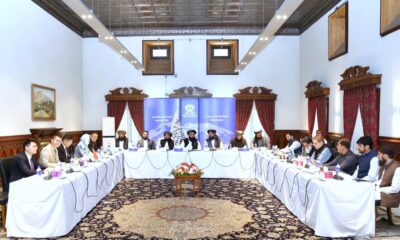Latest News
Coronavirus death toll jumps to 80, more than 2,750 infected

 The coronavirus outbreak that began in the central Chinese city of Wuhan, in the province of Hubei, has killed 80 people in China so far and infected more than 2,750 globally, most of them in China.
The coronavirus outbreak that began in the central Chinese city of Wuhan, in the province of Hubei, has killed 80 people in China so far and infected more than 2,750 globally, most of them in China.
The virus has caused alarm because it is still too early to know how dangerous it is and how easily it spreads between people. Also because it is new, humans have not been able to build immunity to it.
Here is what we know so far:
* As of Jan. 27 the death toll in China had risen to 80, with 76 in Hubei province, authorities reported. Another 2,744 people in China had been infected: As of the end of Jan. 26, there were 1,423 confirmed cases in Hubei province.
* Thailand and Hong Kong have each reported eight cases of infection; the United States and Macau have five each; Taiwan, Australia, Singapore and Malaysia each have reported four; France and Japan three each; Vietnam and South Korea two apiece, and one each in Canada and Nepal.
* No fatalities have been reported outside China.
 * The previously unknown coronavirus strain is believed to have emerged late last year from illegally traded wildlife at an animal market in Wuhan, a city of 11 million people.
* The previously unknown coronavirus strain is believed to have emerged late last year from illegally traded wildlife at an animal market in Wuhan, a city of 11 million people.
* The World Health Organization said that while the outbreak was an emergency for China, it was not yet a global health emergency.
* Symptoms include fever, cough and difficulty breathing. Most of those affected are older people and those with underlying health conditions.* China says the virus is mutating and can be transmitted through human contact.
* Two scientific analyses of the epidemic say each person infected is passing the disease on to between two and three other people.
* Three research teams have begun work on developing potential vaccines, the Coalition for Epidemic Preparedness Innovations said. Scientists hope to be testing the first possible vaccines in three months’ time.
* China is testing the HIV drug Aluvia as a treatment.
 * There are severe travel restrictions in Wuhan, with urban transport shut and outgoing flights suspended.
* There are severe travel restrictions in Wuhan, with urban transport shut and outgoing flights suspended.
* Among other measures to contain the virus, China will halt all group tours, affecting tourism both at home and to other countries, from Jan. 27.
* Hong Kong has barred residents of Hubei province from entering the city.
* France, Italy, Japan, Australia and the United States have all said they are working to evacuate citizens from Wuhan.
* Airports around the world have stepped up screening.
* Some experts believe the virus is not as dangerous as the 2002-03 Severe Acute Respiratory Syndrome (SARS) that killed nearly 800 people, or the Middle East Respiratory Syndrome (MERS), which has killed more than 700 people since 2012.
Source: Reuters
Latest News
IEA’s high-level delegation arrives in Kazan

A high-ranking delegation of the Islamic Emirate, led by Mullah Abdul Ghani Baradar, Deputy Prime Minister for Economic Affairs, arrived on Wednesday in the city of Kazan, the capital of the Republic of Tatarstan, to participate in the 16th Kazan International Economic Forum.
In a statement issued by the deputy PM’s office, the delegation of the Islamic Emirate was given a “warm welcome” at Kazan International Airport by the Deputy Leader of the Republic of Tatarstan.
Latest News
Islamic Emirate welcomes Trump’s move to cancel protection program for Afghan refugees
The Trump administration said Monday it was ending the TPS program that offered deportation protection to thousands of people from Afghanistan.
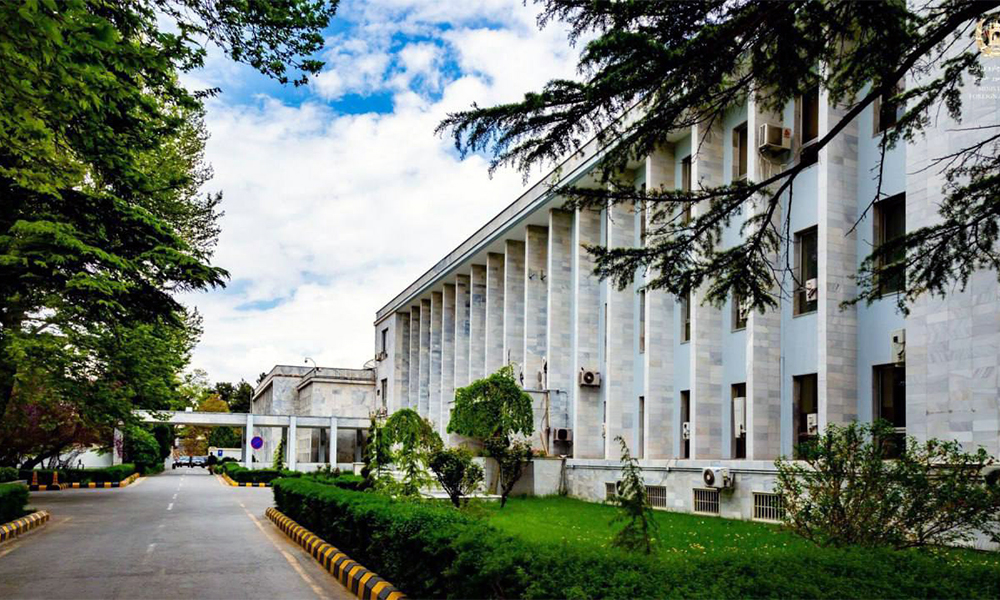
Afghanistan’s Foreign Ministry says the recent announcement by the US Department of Homeland Security on the suspension of the Temporary Protective Program Status (TPS) program for Afghans was a “positive step” and acknowledgement of an improved situation in Afghanistan.
The Trump administration said Monday it was ending the TPS program that offered deportation protection to thousands of people from Afghanistan.
The Islamic Emirate of Afghanistan (IEA) said Wednesday this move “affirms progress in Afghanistan’s security and economic environment”.
The IEA views this as “a clear recognition of progress made in national security, economy and other areas”.
According to a statement, “Afghanistan is the shared home of all Afghans, and all have the right to free movement.”
The IEA also stated that it is ready to engage in constructive dialogue with the US and other countries regarding the repatriation of Afghans who no longer meet criteria to remain in host countries.
“IEA underscores the importance of bilateral mechanisms and consular services for its citizens, in line with established standards, to prevent complications, address national security concerns, and ensure the dignity and rights of returnees,” the statement read.
The US Department of Homeland Security said Monday it will end the program on July 12.
The TPS program allows migrants to get work permits and temporary reprieve from deportation if the US government determines it is unsafe for them to return to their home countries due to war, natural disaster or other issues.
Over 8,000 Afghans were approved for TPS as of last year, according to federal statistics.
TPS was last extended for Afghanistan in 2023, and it was set to expire in May unless the Trump administration chose to grant another extension.
“This decision is unconscionable and will have long-lasting ripple effects,” AfghanEvac, a group that helps relocate Afghans, said in a post on X early this week.
Latest News
Pakistan and Afghanistan inaugurate ‘Friendship Hospital’ at Kharlachi border
The “Pak-Afghan Friendship Hospital”at the Kharlachi Border Terminal is equipped with modern facilities, a laboratory, pharmacy, cardiovascular testing services.

The Afghan government and Pakistan Army have jointly inaugurated a hospital at the Kharlachi border crossing between the two countries.
The “Pak-Afghan Friendship Hospital”at the Kharlachi Border Terminal is equipped with modern facilities, a laboratory, pharmacy, cardiovascular testing services and diabetes and blood pressure screening unit.
According to Pakistan’s special envoy to Afghanistan Mohammad Sadiq, the hospital is expected to serve as a vital healthcare hub, particularly for residents of the border regions and Afghan citizens seeking medical support.
The inauguration ceremony was attended by senior military officials, administrative representatives, and tribal elders from both countries.
Sadiq said the primary objective behind establishing the hospital is to strengthen friendly relations between the people of Pakistan and Afghanistan and to foster the spirit of humanitarian service.
He said the initiative has been widely appreciated by the local communities, who expressed hope that such projects will pave the way for lasting peace, enhanced cooperation, and improved welfare across the region.
The inauguration comes just days after the crossing was reopened to trade after a six-month closure.
Speaking to the media at the crossing, Pakistan’s border in-charge Major Moez and Afghanistan’s border affairs representative Maulana Javed confirmed that trade operations through this border crossing between the two countries officially resumed on Friday.
Moez credited the successful reopening to coordinated efforts between officials from both governments, security forces and tribal elders. “This step is in the best interest of both countries and will promote economic stability in the region,” he stated.
Javed in turn expressed hope for improved bilateral relations, saying: “Afghanistan desires friendly and brotherly ties with its neighbors.”
-

 Latest News4 days ago
Latest News4 days agoPakistan says India launched attack on Afghanistan, India denies
-

 World4 days ago
World4 days agoUS offers to help India and Pakistan start talks, G7 also urges dialogue
-

 Sport4 days ago
Sport4 days agoFIFA OKs creation of Afghanistan women’s refugee team
-
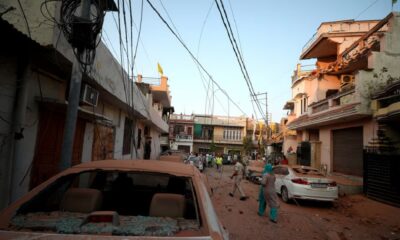
 Regional4 days ago
Regional4 days agoPakistan says it has launched military offensive against India
-

 World4 days ago
World4 days agoTrump says India, Pakistan agree to ‘full and immediate ceasefire’
-
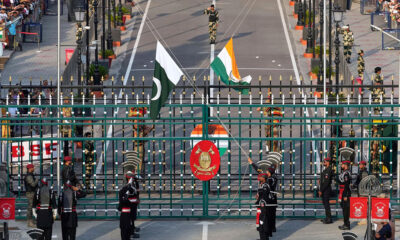
 Regional3 days ago
Regional3 days agoExplosions reported after India and Pakistan agree to ceasefire
-
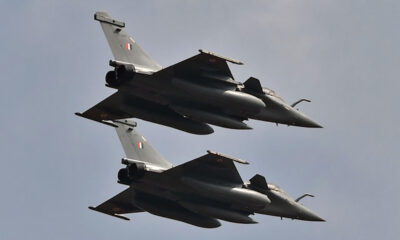
 Regional2 days ago
Regional2 days agoIndian air force says losses are part of combat but all pilots back home
-

 Tahawol4 days ago
Tahawol4 days agoTahawol: Status of Afghanistan’s infrastructure projects reviewed








